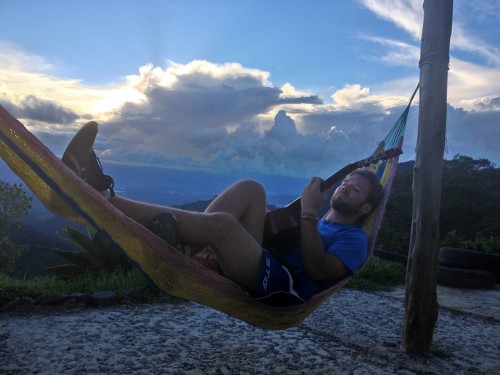Luke Maguire Armstrong of Travel Write Sing
Hometown: Kalispel, Montana
Quote: Hundreds of years from now, it will not matter what my bank account was, the sort of house I lived in, or the kind of car I drove… But the world may be different because I did something so bafflingly crazy that my ruins become a tourist attraction. – Demotivators
How did you find out about Vagabonding, and how did you find it useful
before and during the trip?
2011 I did a book review of “Marco Polo Didn’t Go There” and interviewed Rolf Potts. During my research for the piece, I found out about Vagabonding. I found it informative not of a specific trip, but a certain lifestyle. The word vagabond, is often used negative. For many people it sits on the same linguistic shelf as “hobo” or “homeless.” Vagabonding instilled in me the realization that extended overseas travel was not just possible as a lifestyle, but that if I was honest with myself, this was a lifestyle that I could adopt. At the time I had traveled a bit, and was living abroad. T this helped me in a decision I made in 2012 to become a full-time location independent professional, AKA, a vagabond.
How long were you on the road?
While I have my “bases” in New York, Guatemala and Kenya, I have been on the road for the last two years.
Where did you go?
Cuba, Canada, Kenya, Uganda, Morocco, All across the USA, Mexico, Guatemala, Belize, El Salvador, Nicaragua, Panama, Costa Rica, Honduras Chile, Peru, Colombia, Argentina, France, England, Czech, The Netherlands, Iceland, Spain,
What was your job or source of travel funding for this journey?
Over these last two years, it has been playing music and writing–travel writing, publishing books of poetry, publishing a travel anthology, and doing freelance marketing. I also spent 5 months teaching at an NGO afterschool program in the Bronx, NYC.
Did you work or volunteer on the road?
I spent my last semester abroad in Chile in 2007. After that I ditched my flight home and started hitchhiking Chile in to Alaska. I volunteered in several NGOs along the way. In one of these organization in Guatemala, Nuestros Ahijados, I was offered a director position when the program director abruptly quit. I accepted and stayed for four years managing 100s of employees and volunteers, and supporting a thousand dependents. The highlight of this work came when I opened a malnourished infant center in 2008, which was later featured on ABC 20/20.
Of all the places you visited, which was your favorite?
Cuba
Was there a place that was your least favorite, or most disappointing, or most challenging?
Though this seems contradictory, this was also Cuba. I went to Cuba for closure. My grandmother was a poet like myself, and a very important person in my life. She opened the world of literature to me when on my 13th birthday she gave me a copy of Hemingway’s The Old Man and the Sea. This caused me to have both an interest in Hemingway and Cuba, just as Hemingway had had an interest and love for Cuba.
In December I had a plane ticket to visit my grandmother. She was not doing well. She past away a few days before my plane departed. I showed up in time for her funeral. Her funeral gave me no closure. So I loaded up a bag of her poetry books, and departed for Cuba. She was a world traveler herself and had already wanted to go. In Havana I did the opposite of shoplifting: I smuggled my grandmother’s poetry books onto their shelves. In each I wrote, “To Cuba with love, from Patricia Mees Armstrong, via her grandson.”
Which travel gear proved to be most useful?
A ScotteVest
Least useful?
Nothing comes to mind.
What are the rewards of the vagabonding lifestyle?
Instead of living in a specific place in the world, you simply live in the world. Everywhere is your home and everyone is your neighbor.
What are the challenges and sacrifices of the vagabonding lifestyle?
There are of course, financial concerns, since writing and music are struggles to earn a living from at this stage in my career. When you are always arriving somewhere new, you are also always leaving a place. You are constantly saying goodbye to people and places that you love.
How did your personal definition of “vagabonding” develop over the course of the trip?
Being able to call myself a vagabond and feel that it had a positive, not a negative connotation.
Any advice or tips for someone hoping to embark on a similar adventure?
If you are wondering if you should do it, you have already answered that question: you should. If you are wondering how you will pay for it, trust that openness mixed with the tenacity of not giving up will lead you to find your balance.
When and where do you think you’ll take your next long-term adventure?
I am going to Guatemala on March, 17th. This is one of my bases, so I will be staying for two months. Then I will be traveling to every country in Central America again. This fall I will be traveling to Asia.
Read more about Luke on his blog, Travel, Write, Sing.
Are you a Vagabonding reader planning, in the middle of, or returning from a journey? Would you like your travel blog or website to be featured on Vagabonding Case Studies? If so, drop us a line at casestudies@vagabonding.net and tell us a little about yourself.
Image: Nick Kenrick (flickr)

